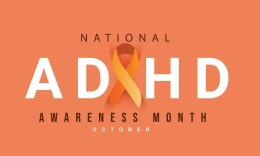
ADHD Awareness Month: Understanding ADHD Beyond the Myths
2025-10-01 14:08:51Attention Deficit Hyperactivity Disorder (ADHD) is one of the most common neurodevelopmental disorders affecting children, adolescents, and adults worldwide. Characterized by persistent patterns of inattention, hyperactivity, and impulsivity, ADHD can significantly impact academic performance, work productivity, relationships, and emotional well-being. Despite being widely discussed, ADHD is often misunderstood due to myths, lack of awareness, and stigma.
October is observed as ADHD Awareness Month, a time dedicated to spreading knowledge, promoting acceptance, and supporting individuals and families living with ADHD. This blog covers everything about ADHD from its symptoms and diagnosis to treatment, management, and awareness campaigns.
What is ADHD?
ADHD (Attention Deficit Hyperactivity Disorder) is a chronic condition that affects brain development and activity. It impacts the ability to focus, regulate impulses, and manage energy levels. ADHD is not just a childhood disorder it continues into adolescence and adulthood, though symptoms may look different at various life stages.
Types of ADHD
According to the Diagnostic and Statistical Manual of Mental Disorders (DSM-5), ADHD is classified into three main types:
Predominantly Inattentive Type (ADHD-PI):
Difficulty focusing, following instructions, and staying organized.
Individuals may appear forgetful or daydream frequently.
Predominantly Hyperactive-Impulsive Type (ADHD-PHI):
Excessive movement, restlessness, and impulsive decision-making.
Often blurting out answers, interrupting conversations, or taking risks.
Combined Type (ADHD-C):
A mixture of inattentive and hyperactive-impulsive symptoms.
Most common type diagnosed in children and adults.
Symptoms of ADHD
ADHD in Children:
Difficulty concentrating on schoolwork
Forgetting homework, losing belongings
Constant fidgeting, running, or climbing
Talking excessively or interrupting others
Trouble following instructions or completing tasks
ADHD in Adults:
Chronic procrastination
Poor time management
Restlessness and difficulty relaxing
Impulsiveness in decisions and spending
Struggles in maintaining stable relationships and jobs
Causes and Risk Factors of ADHD :-
While the exact cause of ADHD is unknown, research suggests multiple factors:
Genetics: ADHD tends to run in families.
Brain Structure & Function: Differences in neurotransmitter activity, especially dopamine.
Environmental Factors: Exposure to toxins (like lead), smoking or drinking during pregnancy.
Premature Birth or Low Birth Weight.
ADHD Diagnosis
Diagnosing ADHD requires a comprehensive evaluation by mental health professionals, including psychiatrists, psychologists, or paediatricians. The process includes:
Reviewing behavioural history.
Gathering feedback from parents, teachers, and caregivers.
Using standardized ADHD rating scales and psychological assessments.
ADHD Treatment Options
There is no cure for ADHD, but effective treatments and management strategies help individuals lead fulfilling lives. 1. Medication for ADHD
- Stimulants: Methylphenidate, amphetamines (commonly prescribed).
Non-stimulants: Atomoxetine, guanfacine (for those who cannot tolerate stimulants).
2. Behavioural Therapy
Helps children develop coping skills.
Parent training programs to manage behaviour.
3. Lifestyle & Holistic Approaches
Regular exercise and balanced diet.
Sleep hygiene and mindfulness practices.
Limiting screen time and distractions.
4. School and Workplace Accommodations
Special education support, extra time in exams, flexible schedules.
ADHD coaching and productivity apps for adults.
ADHD Myths vs Facts
Myth: ADHD is caused by bad parenting.
Fact: ADHD is a neurological condition, not a result of parenting style.Myth: ADHD only affects children.
Fact: ADHD often continues into adulthood.Myth: People with ADHD are lazy.
Fact: ADHD brains function differently; challenges are not due to laziness.
ADHD Awareness Month October
Every October, organizations worldwide observe ADHD Awareness Month to fight stigma and raise understanding.
ADHD in Daily Life: Management Strategies
For Children:
Create structured routines.
Break tasks into smaller steps.
Reward positive behaviour.
For Adults:
Use planners, reminders, and productivity apps.
Practice mindfulness and stress management.
Seek counselling or ADHD coaching.
Importance of Support & Community :-
Living with ADHD requires support not just from medical professionals but also from family, friends, teachers, and co-workers. ADHD support groups, online forums, and therapy communities provide encouragement and shared experiences.
Conclusion:-
ADHD is not a weakness but a unique way of experiencing the world. With the right diagnosis, treatment, and support, individuals with ADHD can thrive academically, professionally, and personally.
As we recognize ADHD Awareness Month in October, let's spread awareness, challenge myths, and create a society that empowers individuals with ADHD rather than stigmatizes them.
Together, we can build an inclusive world where every person with ADHD is understood, supported, and celebrated.
World ADHD Awareness Month
